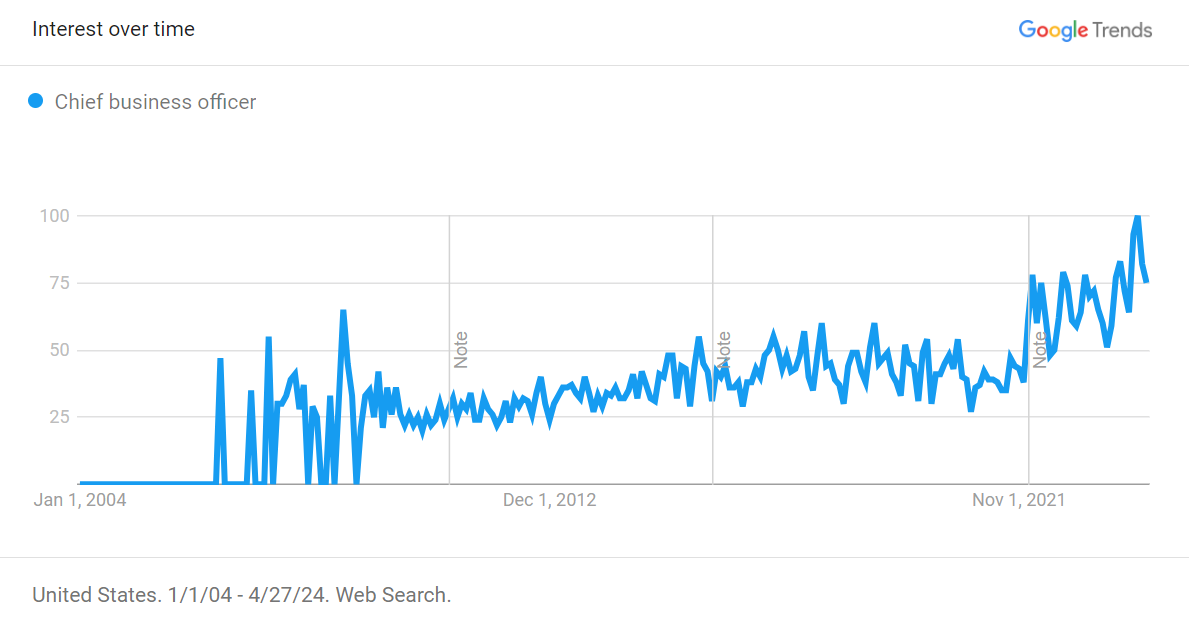Businesses and organizations are constantly evolving to meet market demands and stay ahead of the competition. This evolution comes when teams work together. That collaboration serves to signify the position and need for someone to lead and steer the efforts of the teams.
One key executive role that has gained prominence in recent years is that of the Chief Business Officer (CBO). Below, we’ll explore the significance of a CBO, their role within an organization, and the impact they have on business growth and development.
What does a Chief Business Officer (CBO) do?

The Chief Business Officer (CBO) is a high-ranking executive responsible for overseeing the strategic direction and growth initiatives of a company.
While the specific duties may vary depending on the organization, the primary focus of a CBO is to drive business expansion, maximize revenue streams, and foster innovation.
Role and Responsibilities of a CBO
Strategic Planning and Implementation
A CBO plays a pivotal role in formulating and executing strategic plans that align with the company’s objectives and long-term vision. This involves analyzing market trends, identifying growth opportunities, and developing strategies to capitalize on them effectively.
Revenue Generation
One of the primary responsibilities of a CBO is to drive revenue growth through various channels, such as product development, sales and marketing initiatives, and strategic partnerships. They are tasked with maximizing profitability while ensuring sustainable business practices.
Business Development
CBOs are instrumental in expanding the company’s market presence by exploring new markets, acquiring or partnering with complementary businesses, and fostering relationships with key stakeholders. Their expertise in business development helps drive expansion opportunities and enhances the organization’s competitive advantage.
Cross-Functional Collaboration
Effective collaboration across departments is essential for achieving organizational goals. CBOs work closely with other senior executives, including the CEO, CFO, and CMO, to ensure alignment across different functions and drive cohesive business strategies.
Find Out More: What is a DOA in Business? Components and How to Develop It
Qualifications and Skills Required for a CBO Position
The role of a Chief Business Officer demands a unique blend of leadership, strategic vision, and business acumen. While specific qualifications may vary, most CBOs possess advanced degrees in business administration or related fields, coupled with extensive experience in executive leadership roles.
Key skills required for a CBO position include:
- Strategic planning and execution
- Financial management
- Business development and partnership building
- Strong interpersonal and communication skills
- Ability to drive change and innovation
- Analytical and problem-solving abilities
Skills Needed for a CBO
Chief Business Officers (CBOs) require a diverse set of skills, ranging from strategic planning and financial management to leadership, communication, and collaboration, to effectively drive business growth and success.
- Strategic Planning
CBOs must possess strong strategic planning abilities to develop and execute long-term business strategies aligned with the organization’s goals and market dynamics.
- Financial Management
A solid understanding of financial principles and practices is essential for CBOs to effectively manage budgets, allocate resources, and maximize profitability.
- Business Development
CBOs need excellent business development skills to identify growth opportunities, forge strategic partnerships, and expand the company’s market presence.
- Leadership
Strong leadership qualities, including vision, charisma, and the ability to inspire and motivate teams, are essential for CBOs to drive organizational success.
- Communication
Effective communication skills, both verbal and written, are critical for CBOs to convey ideas, negotiate deals, and build relationships with stakeholders.
- Analytical Thinking
CBOs must be adept at analyzing market trends, assessing competitive landscapes, and making data-driven decisions to drive business growth and innovation.
- Problem-Solving
The ability to identify challenges, devise creative solutions, and overcome obstacles is crucial for CBOs to navigate complex business environments successfully.
- Collaboration
CBOs need strong collaborative skills to work effectively with other senior executives, department heads, and external partners to achieve common objectives.
- Adaptability
Given the dynamic nature of the business landscape, CBOs must be adaptable and open to change, capable of adjusting strategies and tactics to meet evolving market conditions.
- Negotiation
Proficiency in negotiation techniques is essential for CBOs to secure favorable deals, partnerships, and agreements that drive business growth and profitability.
Challenges Faced by Chief Business Officers
Despite their critical role, CBOs often encounter various challenges in fulfilling their duties. These may include:
- Balancing short-term objectives with long-term strategic goals
- Navigating complex regulatory environments
- Managing stakeholder expectations
- Adapting to rapid technological advancements
- Overcoming resistance to change within the organization
Differences between a Chief Business Officer and COO
A Chief Business Officer (CBO) is a high-level executive responsible for driving business growth and development within an organization. On the other hand, a Chief Operating Officer (COO) focuses primarily on overseeing day-to-day operations and ensuring efficient business processes.
Key differences between a CBO and a COO include:
- Focus: While both roles involve executive leadership, CBOs primarily focus on driving business growth and revenue generation, whereas COOs focus on optimizing internal operations and ensuring efficiency.
- Responsibilities: CBOs are responsible for strategic planning, business development, and revenue generation, while COOs are responsible for operational oversight, process improvement, and resource allocation.
- External vs. Internal: CBOs are more externally focused, engaging with stakeholders, exploring new markets, and forging partnerships, while COOs are more internally focused, optimizing processes, managing resources, and mitigating operational risks.
- Collaboration: While both roles require collaboration with other senior executives, CBOs often collaborate externally with partners and stakeholders, while COOs collaborate internally with department heads and operational teams.
FAQs
- What is the difference between a Chief Business Officer and a Chief Executive Officer?
While both roles involve executive leadership, the Chief Executive Officer (CEO) is typically responsible for overall corporate strategy and operations, while the Chief Business Officer (CBO) focuses more specifically on business development, revenue generation, and growth initiatives.
- Can a Chief Business Officer also serve as a Chief Operating Officer?
In some organizations, the roles of CBO and COO may overlap, especially in smaller companies. However, larger corporations often have separate executives dedicated to business development and operations. - What industries commonly employ Chief Business Officers?
Chief Business Officers are prevalent across various industries, including technology, healthcare, finance, and consumer goods. Any organization seeking strategic growth and expansion can benefit from having a CBO. - What qualifications are required to become a Chief Business Officer?
A CBO typically holds advanced degrees in business administration or related fields, along with extensive experience in executive leadership roles. Strong strategic planning, financial management, and business development skills are essential for success in this position.
- How does a Chief Business Officer contribute to revenue generation?
A CBO drives revenue growth through various initiatives, such as product development, sales and marketing strategies, strategic partnerships, and market expansion efforts.


